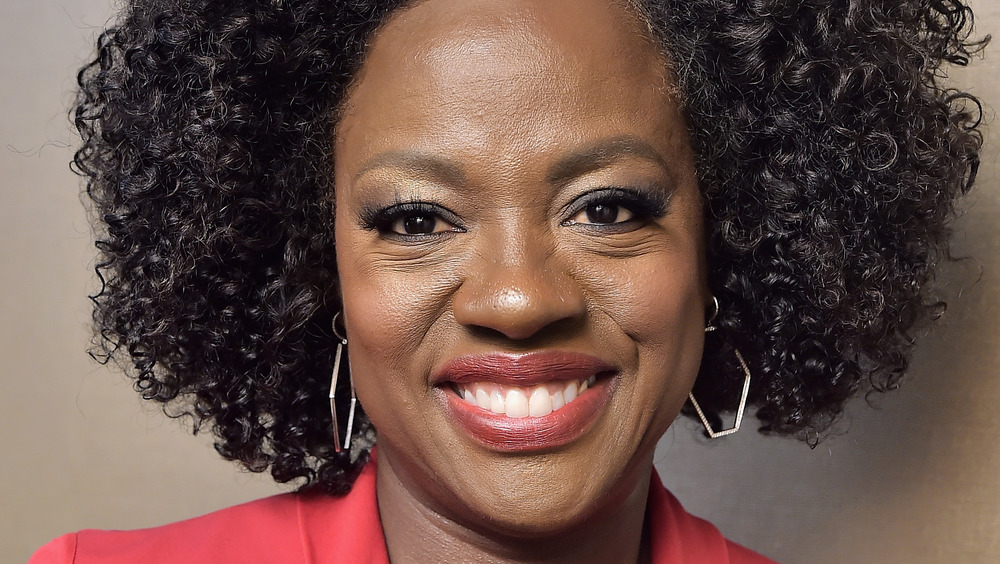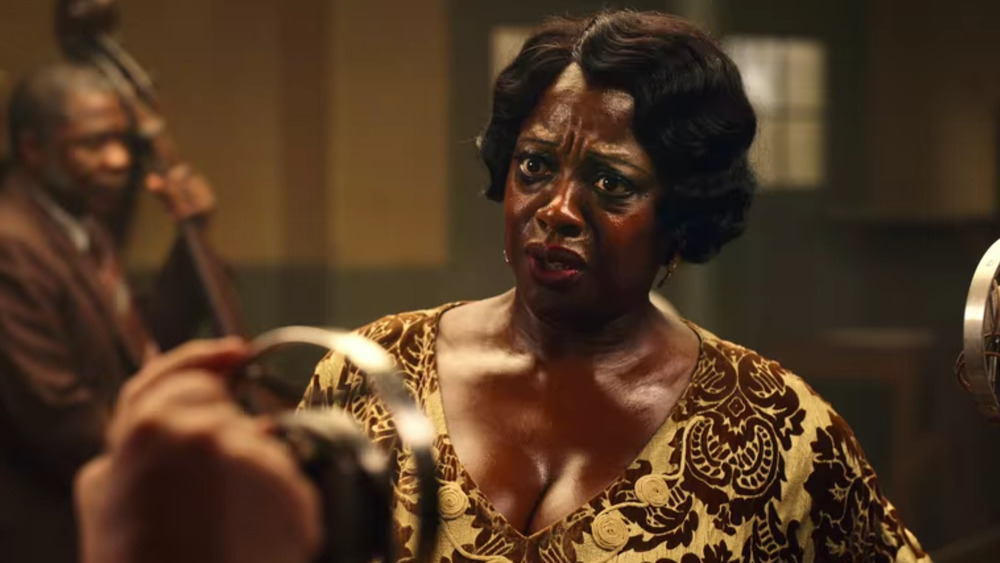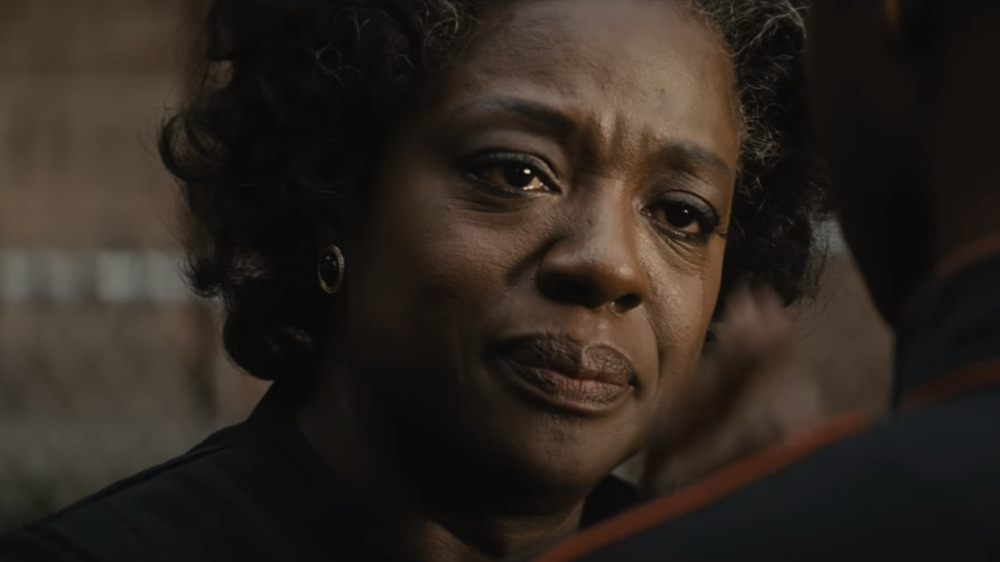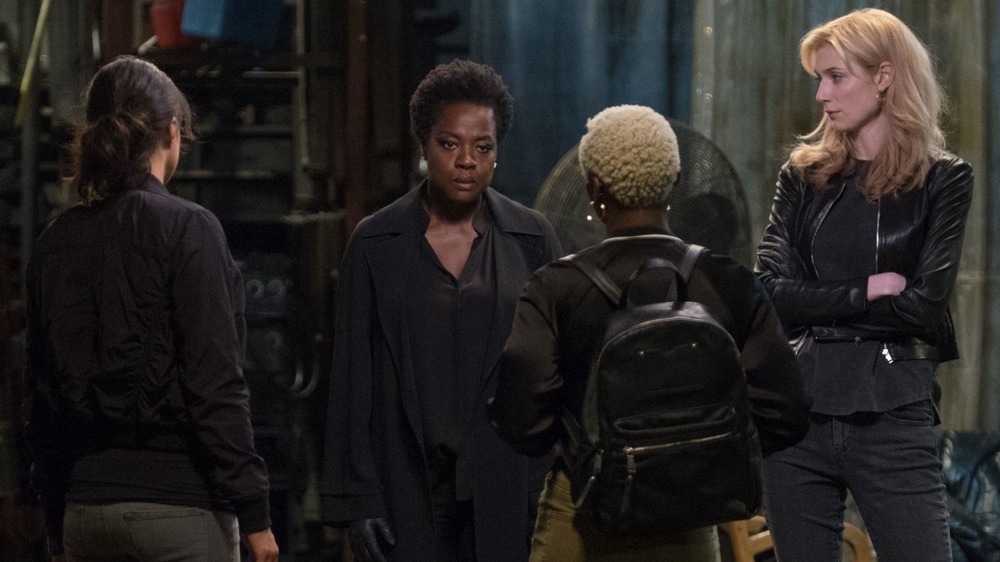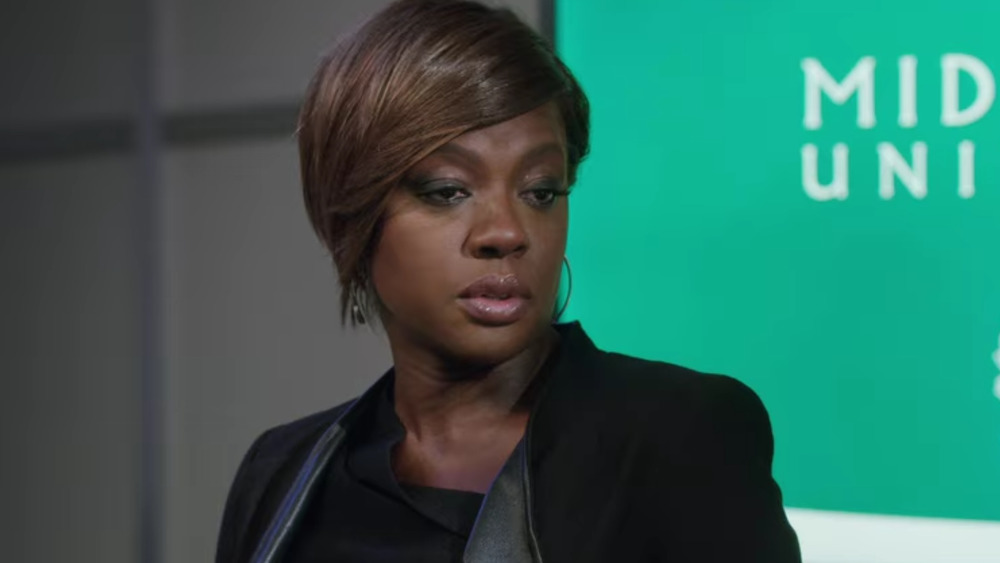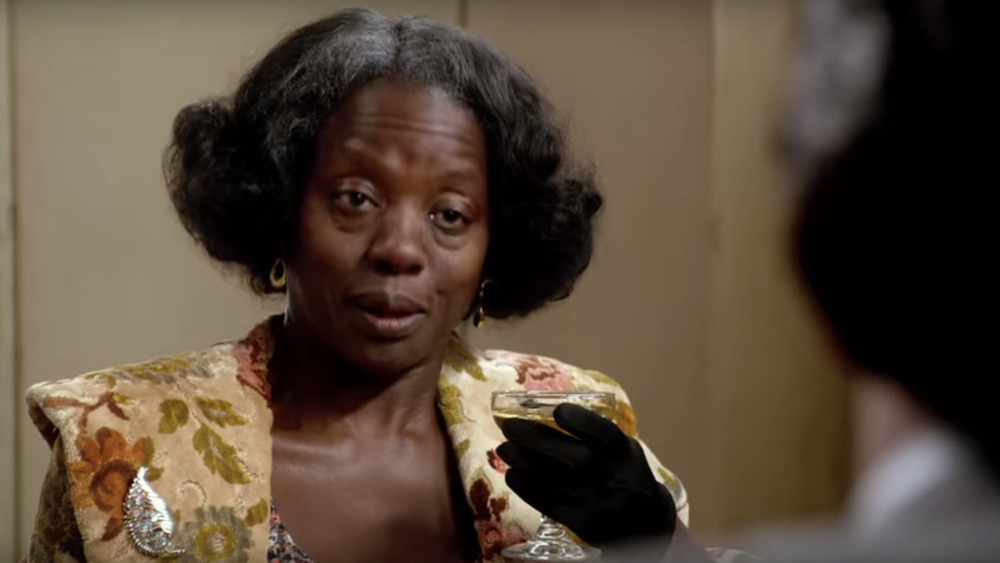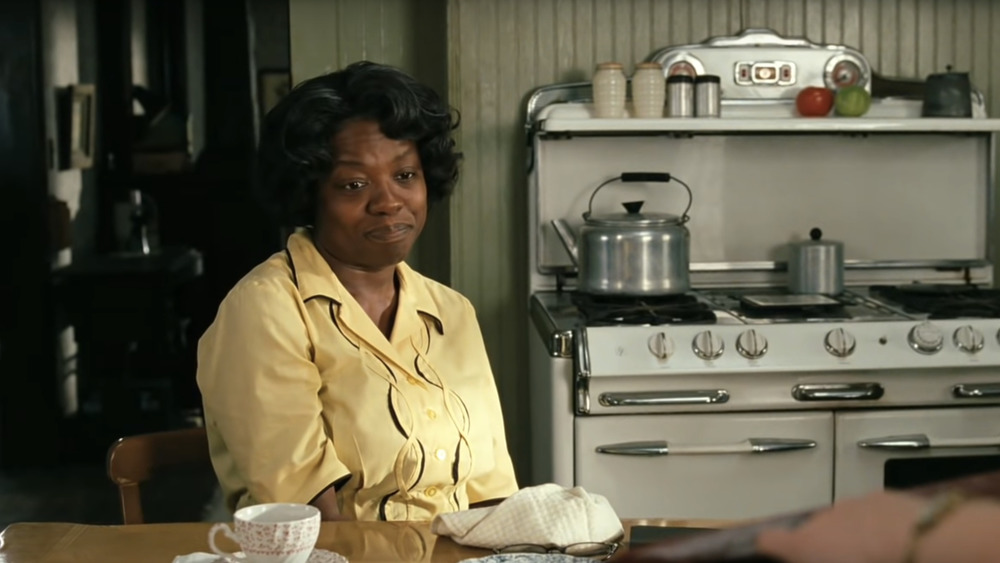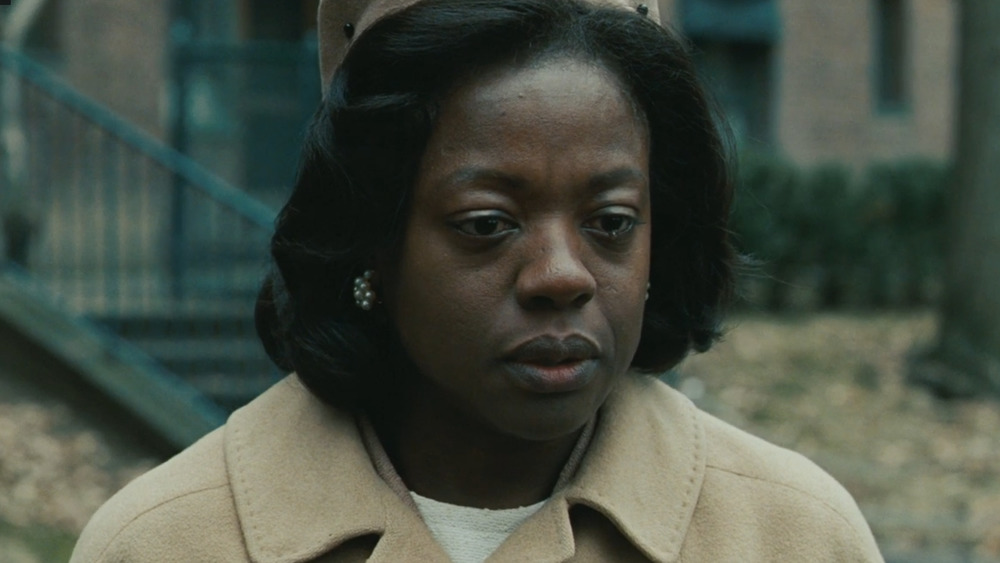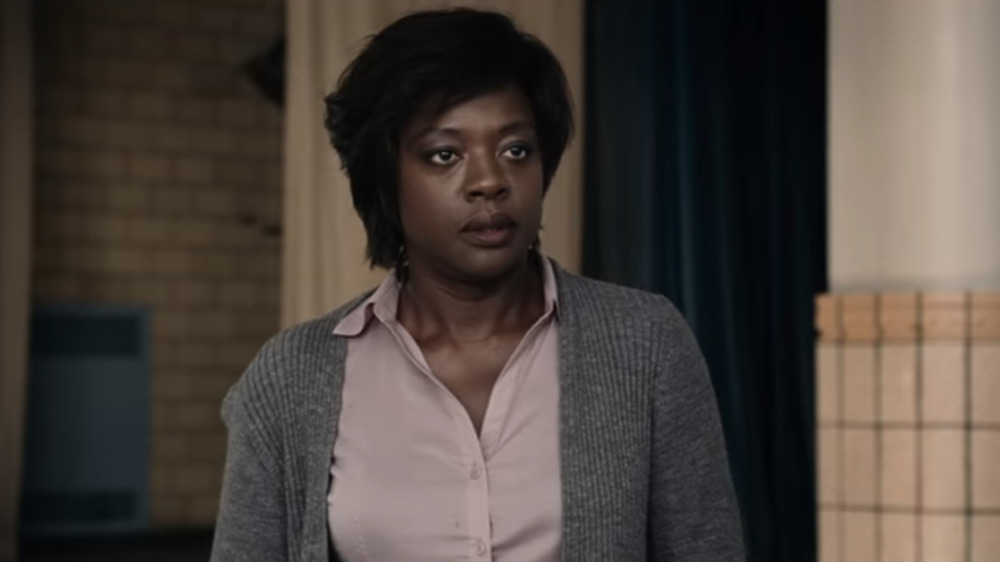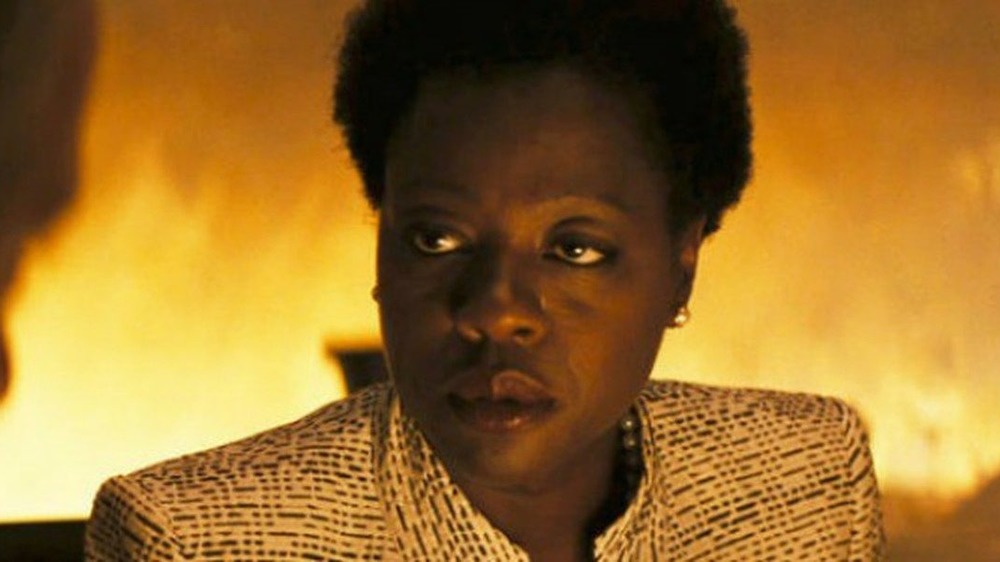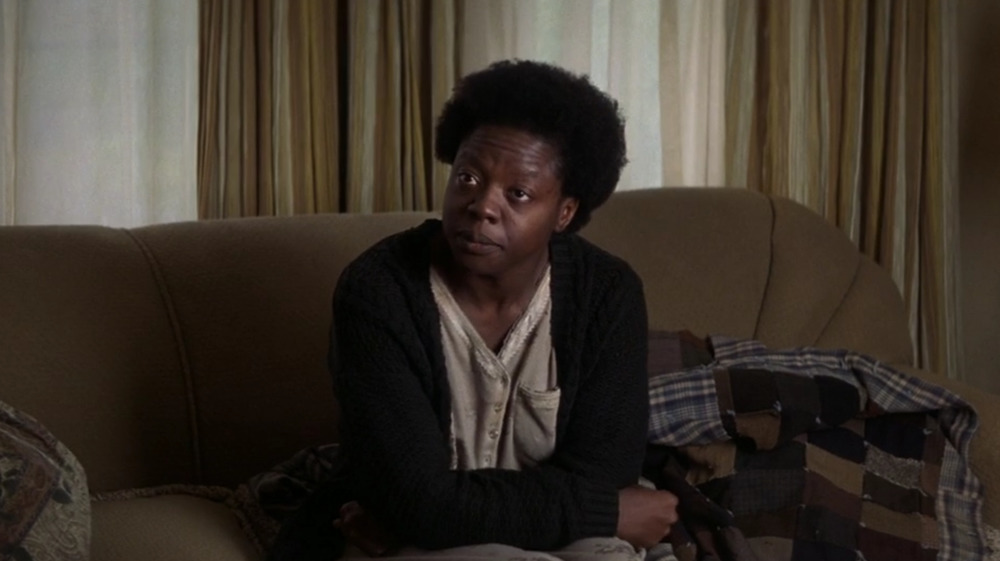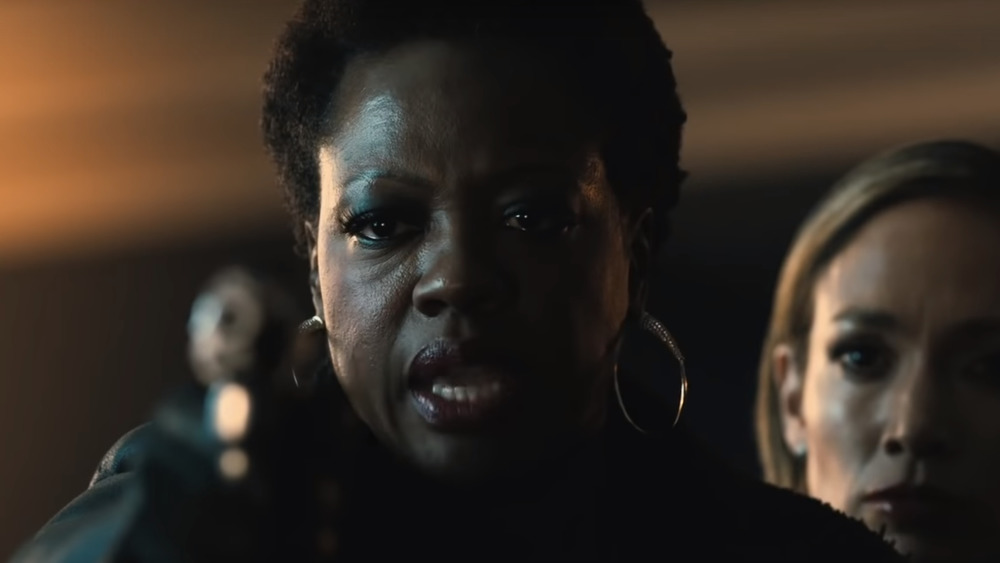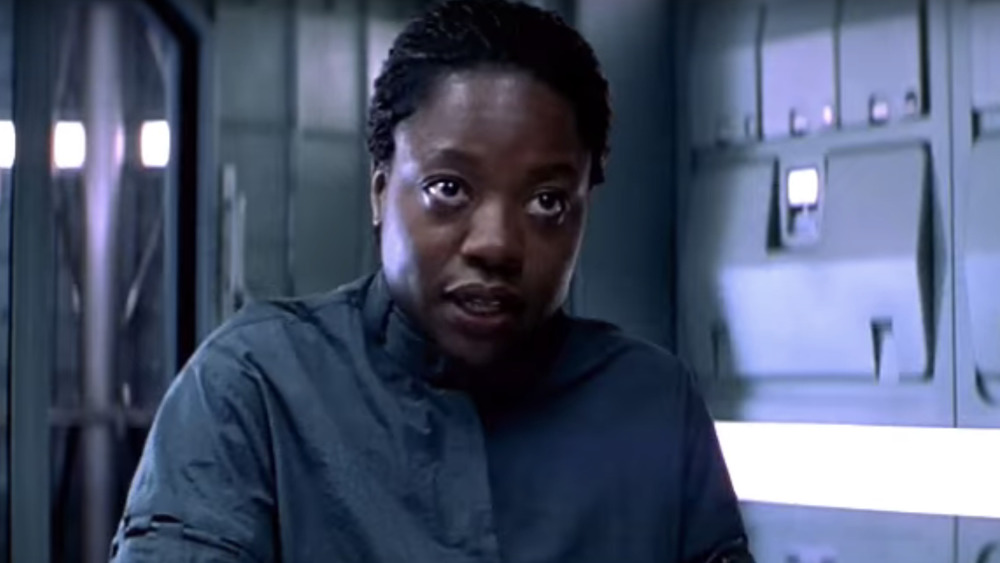Viola Davis' Best On-Screen Performances To Date
Viola Davis is one of our most remarkable actresses, a phenomenal performer with the kind of charismatic screen presence that has few rivals. She's played cold-blooded administrators, vulnerable but hardened survivors, weary and beleaguered women, and high-powered successes who wield their influence with ruthless effectiveness. We have a sense of a typical Viola Davis performance — in-depth and impossible to look away from — but there's no typical Viola Davis role. And with her kind of range, there's no reason for there to be. Having gone through her filmography, we're prepared to say that Davis can take on anything.
She's already had a stellar career, and her prominence has only increased over the years. She's worked with a star-studded list of directors and actors, and several have sought her out more than once. That's no surprise. As Sonia Saraiya wrote in a Vanity Fair profile of Davis, "[She] lends extraordinary gravity to the roles she plays, a presence both weighty and magnetic." The word "magnetic," in particular, tends to show up again and again in reviews of Davis' work. She draws viewers in and captures them completely. She transforms average — or even outright bad — material and knocks good writing out of the park, making it no surprise that she's gathered up awards and nominations from all across the industry.
And now, we're here to look at some of her fantastic (and often award-worthy) work. Here are the best on-screen performances of Viola Davis.
Viola Davis gives a powerhouse performance in Ma Rainey's Black Bottom
A lot of actresses find good roles start to disappear when they turn 40, let alone 50. But Viola Davis has excelled at finding opportunities for powerhouse performances, and nothing shows that better than 2020's Ma Rainey's Black Bottom. Davis plays the title character, "Mother of the Blues" Ma Rainey. Ma, as everyone calls her, is scheduled for a recording session, and everything that can happen in the course of those few hours will happen. The film compresses conflicts about art, race, desire, professionalism, and God into 94 minutes, all grounded by Chadwick Boseman and an absolutely magnetic Davis.
Davis garnered a Best Actress nomination and considerable praise from critics. A lot of reviews understandably focus on how the film has Boseman's electrifying final performance, so it says a lot about Davis' earthy sense of power here that all the same notices make it clear she's a standout. Moira Macdonald with The Seattle Times says, "The remarkable Davis imbues [Ma] with weary grandeur. ... Her voice is low; her walk is heavy; and her smudged, sweaty makeup makes her face look like a bruised mask. There's no glamour here, but Ma doesn't care; she's in charge." Alonso Duralde of The Wrap concurred, saying, "[Davis] suffuses her every line and action with a career's worth of artistic hurdles and indignations." It can be hard to portray a legend, but Davis has the sheer, regal force necessary to make us feel we're in the presence of someone remarkable.
Fences earned the actress an Oscar
Playwright August Wilson's work has been staged by a number of high-profile Black actors, including Viola Davis. She played Rose Lee Maxson on Broadway before she (along with Denzel Washington) immortalized the role on screen in 2016's Fences. That theatrical experience carries over to the film, which has an incredible emotional intensity and, despite its period setting, immediacy. Fences is a drama about clashes in ambition, expectations, and hopes within one Pittsburgh family. Davis plays the wife of Washington's vivid, deeply flawed character, a woman who loves her husband but has to contend with his adultery and his actions that threaten to split the family in two.
Even though Rose isn't the film's central character, Davis was repeatedly singled out for acclaim. In Variety, film critic Owen Gleiberman wrote, "The acting is all superb. ... Viola Davis delivers a monologue of tearful, scalding, nose-running agony that shows you one woman's entire reality breaking down." The New York Times also highlighted how she handled her less showy part, saying, "As incarnated by Ms. Davis, [Rose] is more than a foil and a helpmate. ... [She's] not just the film's conscience, but also its central mystery." It's unsurprising that this led to Davis' first Academy Award win, nabbing the prize for Best Supporting Actress.
Davis leads a thrilling heist in Widows
In 2018, Viola Davis took the lead of a stunning ensemble in Steve McQueen's thriller, Widows, where four women team up to steal $5 million — partly for their own (much-needed) gain but also but for a much bleaker reason. Their husbands, now dead, stole the mob's money, and now the widows have to pay the gangsters back. Time for a heist, one filmed in McQueen's gripping style.
Widows was critically acclaimed, but even reviewers who were unmoved by the film as a whole had good things to say about Davis' performance. Entertainment Weekly's Leah Greenblatt thought the film was a disorganized mess, but she admitted that "a story centered on Viola Davis can't go too wrong, at least." There's just something about Davis that seems to burn through the screen. IndieWire's Eric Kohn, on the other hand, loved the "bracing, moody heist thriller," and said, "Widows largely belongs to Davis, whose character steps into her husband's shoes when every other option runs out. The actress has never been more commanding." Davis received a BAFTA nomination for Best Actress in a Leading Role and also walked away with the Black Film Critics Circle award for Best Actress.
Viola Davis took over TV with How to Get Away with Murder
While most of Viola Davis' high-profile work has been on the big screen, she's had a considerable television presence over the years through TV movies and recurring guest star spots. But until 2014, she never had a regular television role that really picked up steam. Then along came ABC's How to Get Away with Murder and her iconic character, law professor Annalise Keating.
How to Get Away with Murder is an acclaimed, ultra-twisty legal thriller where Annalise and her students get (repeatedly) entangled in high-stakes murderous mysteries. Both reviews and awards have repeatedly singled out Davis as a major reason the hit show works, with Davis gathering up a whole host of trophies and nominations, including an Emmy for Outstanding Lead Actress in a Drama Series. (She was the first Black actress to receive the award.)
Mary McNamara with the Los Angeles Times said, "All eyes are on Davis. ... Magnetic and intimidating, Davis creates an implacable surface beneath which shimmers all manner of fleet and startled emotions." In a series full of high drama, Davis offers a performance that's both transfixing and minimalist, dependent, as McNamara notes, on glances and micro-expressions. Entertainment Weekly called Davis the show's "not-so-secret weapon ... whose authoritative presence and calm hand lend gravitas to even the most absurd plot turns." No matter what's happening on screen, Davis makes it feel believable, allowing the show to ... well ... get away with murder.
She broke our hearts in Get on Up
Get on Up gives audiences a dynamic, unconventional perspective on James Brown's life, and one of the strongest emotional hooks of the film is the troubled relationship between Brown (Chadwick Boseman) and his mother (Viola Davis). Susie Brown leaves her son behind when he's still young, falling into a life of prostitution, and they never quite reconcile. It's a strongly bittersweet beat.
Music critic Robert Christgau described their failed reunion as an especially key scene, writing, "Chadwick Boseman's astonishing Brown and Viola Davis's subtle Susie have their most complex moments in that ... scene, trapped in a past no time-traveling shamanism can make right." Their performances carry what he considered to be a too simplistically written backstory. Other reviewers also mention the strength of Davis' performance. And The Irish Times singled her out emphatically, saying, "Viola Davis ... again stakes a claim to be regarded the best actress of her generation." It takes a lot to make that kind of mark with a role that another critic rued was basically an "extended cameo."
She more than helped with The Help
One of the most necessary skills an actress can have is the ability to make the most out of limited material, and few performances show that as well as Viola Davis' in The Help. Davis plays Aibileen Clark, a longtime maid whose work over the years has ground her down and whose dignity is an act of resistance. Together with another maid, played by Octavia Spencer, she serves as a source for Emma Stone's Skeeter Phelan, who's trying to write a book about the day-to-day reality of being a Black maid in the white suburban South.
Viola Davis' impact on the hit film's success is obvious. She received an Academy Award nomination for Best Actress, and review after review praised her performance. Vulture's David Edelstein said, "The Help belongs to Viola Davis. ... It's a tough, beautifully judged performance — it gives this too-soft movie a spine." But the acclaim and the Oscar nomination couldn't overcome Davis' own uncertainty about the role, which she later said she regretted having accepted. When she talked about the part with Vanity Fair, she said, "There's no one who's not entertained by The Help. But there's a part of me that feels like I betrayed myself and my people because I was in a movie that wasn't ready to [tell the whole truth]." Despite the inappropriately lightweight way the material is handled, Davis burns through the fluff. No matter what's going on elsewhere, that sense of truth comes through with her.
Viola Davis stole the show in Doubt
Released in 2008, Doubt is an intense and thought-provoking film. The movie turns on an enormous unanswered question about the nature of a priest's relationship with a boy at a parish school. It's a story where everything is uncertain, from the truth to the motivations of the people involved. It's full of great performances, with an incredible core cast of Philip Seymour Hoffman, Meryl Streep, and Amy Adams. But as good as everyone is, Viola Davis might give the most memorable performance. With only a small amount of screen time, she leaves an outsized mark as the boy's mother, a woman forced into an impossible position.
Critics immediately recognized Davis' incredible impact. Roger Ebert called the conversation between Davis and Streep as "a scene as good as any I've seen this year. It lasts about 10 minutes, but it is the emotional heart and soul of Doubt, and if Viola Davis isn't nominated by the Academy, an injustice will have been done." (He could rest easy. She was indeed nominated, although she wouldn't get a win until 2017.) Salon said that she played her character with "a near-miraculous level of believability" and left even the rest of the impressive cast in the shade.
Davis prizes her experience on the film, especially the chance to work with Streep, who worked hard to champion Davis during the awards season. In a profile with Vanity Fair, Davis said, "What do you call someone who shares your belief system? ... She's in my tribe, Meryl is."
Won't Back Down gave her a chance to show off her skills
Won't Back Down focuses on a single mother (Maggie Gyllenhaal) and a teacher (Viola Davis) who band together to try to save a failing elementary school. By and large, critics in 2012 were dismissive of the film, which arguably oversimplifies a lot of controversial issues over public education. Variety's Peter Debruge called it a "disingenuous pot-stirrer [that] plays to audiences' emotions rather than their intelligence." But even if the story is too flat and simplistic, the performances aren't.
And for years, it was rare to see Davis front-and-center in a movie. Whatever the film's drawbacks, it's great to watch her get a chance to flex her dramatic muscles. And reviewers took note of her showing, too, with Richard Propes at The Independent Critic writing, "The film is stolen ... by Viola Davis' magnificent turn as Nona. ... Davis gives a workshop in the art of physical acting, her body becoming a cinematic vessel of apathy, frustration, sadness, grief, and determination." The co-lead role was a sign of things to come — two years later, Davis would become a primetime hit heading up How to Get Away with Murder, a career transformation that might not have happened without Won't Back Down as a stepping stone.
Amanda Waller was the best part of Suicide Squad
Suicide Squad probably needs no introduction. Its assembled rogues' gallery of villains turned amoral antiheroes, though, needed a leader — someone to recruit them, control them, and potentially reward them. It ostensibly left the film with a problem. Who was going to seem strong enough to hold the leash on characters like Harley Quinn, Deadshot, Killer Croc, and Captain Boomerang? Who could play Amanda Waller? Answer — Viola Davis.
No one's better than Davis at projecting steely authority, and Waller's unflinching use of her power was one of the things that attracted Davis to the role. She told Empire, "When you look at her, there's nothing that seems dangerous. Her only power is her intelligence and her complete lack of guilt." In other words, that's the perfect candidate for wrangling a bunch of superpowered assets.
Critics concurred, too. Davis fulfilled the role perfectly, showing viewers everything she herself had found in her character. IGN's Joshua Yehl said, "Viola Davis completely owns the role of Waller. ... She dominates everyone she shares a scene with and makes them look ten times as small." Yehl even noted that when Davis disappears from the story, things start going downhill. Similarly, Uproxx's Steven Hyden called her "the best part of the movie by a mile."
Antwone Fisher got critics' attention
Antwone Fisher, the 2002 directorial debut of Denzel Washington, is a biopic following the life of its title character, a sailor who needs psychiatric help confronting his traumatic past. Viola Davis plays Antwone's mother, Eva May, with whom he must eventually find some degree of closure.
The role earned Davis a nomination for an Independent Spirit Award for Best Supporting Female. It's one of several cases of Davis making a huge impression with a small amount of screen time. Roger Ebert paused in his review to consider Davis' remarkable range, calling it a "striking performance" and noting its contrast with her roles in films like Solaris and Far from Heaven.
In a profile on Davis on The Film Experience, Nick Taylor called 2002 Davis' "breakthrough year," praising how well she uses her stillness and silence in her climactic scene in Antwone Fisher and noting how much stronger the film is for the choice to let the camera linger on her face during that scene. "It's tremendously moving, and concluding their scene by sitting with Eva May's unresolved sadness rather than Antwone's sense of fulfillment is among the strongest touches in this well-acted film." One of the things that made 2002 such an important year for Davis' career is that way it showcased her use of the smallest expressions and her ability to indicate tremendous depth without saying a word.
Lila & Eve is worth watching for just one reason
Lila & Eve is a 2015 vigilante thriller about two mothers — played by Viola Davis and Jennifer Lopez — striking back after the deaths of their children. The film received lackluster reviews, with many critics dinging it for weak storytelling and feeling too familiar. The New York Times even referred to it "a shallow, cut-rate Thelma & Louise."
But even when critics were unimpressed with the film, they were in awe of Davis. The New York Times said her "thunderous lead performance" was the "main, and perhaps the only, reason" to see the film. "Ms. Davis projects an ominous gravity. Even when smiling, she always means business." Reel Talk Online opened up their review with, "In case you didn't already know, Viola Davis is kinda amazing." In fact, Davis is mentioned so positively — and so frequently — in reviews that praise of her performance makes the Rotten Tomatoes "Critic Consensus."
Davis may have been in better movies, but she's still had a career where starring roles have been unfortunately thin on the ground, and it's great to see her getting to play such a major part. Lila & Eve also helped ease her into a more genre-heavy, action-fueled part of her career, which would lead to things like Suicide Squad and Widows.
Solaris was a big moment for Viola Davis
Steven Soderbergh's Solaris is a fascinating, ambitious remake that's closer to 2001: A Space Odyssey than to Star Wars. Most audiences hated it. It's one of the few films that have received a CinemaScore of F, leading to a flop at the box office. That's not the usual fate for a George Clooney movie. But even if it found a rocky reception, it was a good career move for Viola Davis. Her prominent supporting role as Dr. Gordon helped her get an even bigger industry profile.
The Film Experience names it as one of the roles that helped Davis break out, saying, "Dr. Gordon only exists through Davis' ability to convey character through mood and personality, adding ambiguities and complications to a role that barely exists on the page." That's one of Davis' biggest strengths as an actress, and it's part of what always makes her capture an audience's attention. IndieWire also pegs it as one of the moments where Davis' reputation started to properly emerge, saying Davis showed "flashes of the brilliant performances for which she's now known."
Even Davis herself felt that this was a moment of transformation for her career. In an interview with AARP, she said that getting offered the Solaris part — a jump up in profile from her smaller role in Soderbergh's Out of Sight — felt like a sign that she had at last arrived. The world was about to get to know Viola Davis.
